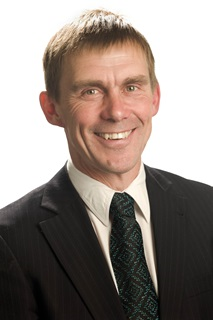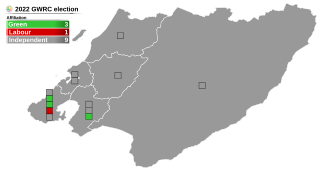
Triennial elections for all 74 cities, districts, twelve regional councils and all district health boards in New Zealand were held on 9 October 2004. Most councils were elected using the first-past-the-post method, but ten were elected using the single transferable vote (STV) method. It was the first time that the STV method was available; the change came through successful lobbying by Rod Donald.
Instant-runoff voting (IRV) is a ranked voting method used in single-winner elections. IRV is also known outside the US as the alternative vote (AV). Today it is in use at a national level to elect the Australian House of Representatives, the National Parliament of Papua New Guinea, the President of Ireland and President of India. In Australia it is also used for elections to the legislative assemblies of all states and territories except Tasmania and the Australian Capital Territory, and for the Tasmanian Legislative Council.

Helen Mary Smith was a New Zealand artist, teacher and politician. She was a Porirua City Councillor from 1973 until 2001.

Triennial elections for all 73 cities and districts, twelve regional councils and all district health boards (DHBs) in New Zealand were held on 13 October 2007. Most councils were elected using the first-past-the-post voting method, but eight were elected using single transferable vote.
The 2011 New Zealand voting system referendum was a referendum on whether to keep the existing mixed member proportional (MMP) voting system, or to change to another voting system, for electing Members of Parliament to New Zealand's House of Representatives. It was held on 26 November 2011 in conjunction with the 2011 general election.
The 2010 Wellington City mayoral election is part of the 2010 New Zealand local elections. On 9 October 2010, elections were held for the Mayor of Wellington plus other local government roles. Sitting Green Party councillor Celia Wade-Brown defeated incumbent mayor Kerry Prendergast and four other candidates.
The 2010 Wellington Region local elections were part of the 2010 New Zealand local elections, to elect members to sub-national councils and boards. These elections covered one regional council, eight territorial authority councils, three district health boards, and various community boards and licensing trusts.

The Mayor of Porirua is the head of the municipal government of Porirua, New Zealand, and presides over the Porirua City Council. The mayor is directly elected using the single transferable vote electoral system. There have been six mayors since the establishment of the borough council in 1962: the current mayor is Anita Baker, who was elected in October 2019.

Nicholas Oliver Leggett is a former New Zealand politician and, as of 2016, a member of the New Zealand National Party. He was Mayor of Porirua from 2010 until 2016, and at the time of his election in October 2010, he was the youngest mayor in New Zealand.

Local elections are held every three years ending on the second Saturday in October in New Zealand to elect local government politicians using postal voting.

The 2013 New Zealand asset sales referendum is a citizens-initiated referendum that took place by postal ballot from 22 November 2013 to 13 December 2013. It was on the Fifth National (Key) government's policy to partially privatise four energy-related state-owned enterprises and reducing the government's share in Air New Zealand.
The 2013 Wellington City mayoral election is part of the New Zealand local elections. On 12 October 2013, elections were held for the Mayor of Wellington plus other local government roles. Wade-Brown was re-elected.

The 2016 New Zealand local elections were triennial local elections to select local government officials and District Health Board members. Under section 10 of the Local Electoral Act 2001, a "general election of members of every local authority or community board must be held on the second Saturday in October in every third year" from the date the Act came into effect in 2001, meaning 8 October 2016.

The 2016 Christchurch mayoral election was part of the New Zealand local elections held on 8 October. The incumbent mayor, former Labour MP and government Minister Lianne Dalziel, who was first elected in the 2013 mayoral election was reelected, winning a commanding 83.9% of formal votes cast in the poll. However New Zealand's local government elections in 2016 were characterized by a nationwide low participation rate which saw only 41.8% of enrolled voters cast a ballot in the election. Christchurch's turnout rate was particularly low with only 38.3% of enrolled voters actually voting, down from 52.2% in 2010.

The 2016 Wellington City mayoral election was part of the New Zealand local elections and was held on 8 October to determine the next Mayor of Wellington. The incumbent was Celia Wade-Brown, who was first elected in the 2010 mayoral election. Wade-Brown did not seek re-election. Her title was pursued by her deputy, Justin Lester, councillors Jo Coughlan, Andy Foster, Helene Ritchie and Nicola Young, former mayor of Porirua City Nick Leggett and independent candidates Keith Johnson and Johnny Overton.

Andrew John Whitfield Foster is a New Zealand politician. He was elected to the New Zealand House of Representatives as a list MP for the New Zealand First party in the 2023 New Zealand general election.

Michael Darren Tana is a New Zealand politician and trade union leader. He was mayor of Porirua from 2016 to 2019.

The 2019 Wellington City mayoral election was part of the New Zealand local elections and was held on 12 October to determine who would serve as Mayor of Wellington for the next three-year term. It was won by Andy Foster, who unseated the incumbent Justin Lester by 62 votes.
The 2022 Wellington City mayoral election, part of the Wellington local elections in October 2022, determined who would serve as Mayor of the City of Wellington for the next three-year term. It was won by Tory Whanau, a former Green Party parliamentary chief of staff.

The 2022 Wellington Region local elections were held on 8 October 2022 as part of the wider 2022 New Zealand local elections to elect members to sub-national councils and boards. These elections covered one regional council, eight territorial authorities, and various community boards and licensing trusts.










